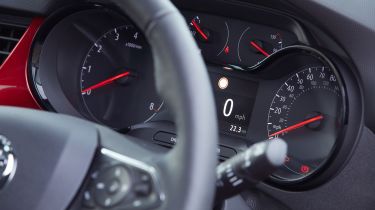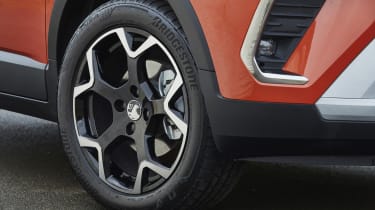Vauxhall Crossland SUV - MPG, running costs & CO2
Low weight and modern engines mean the Vauxhall Crossland will be cheap to run
The whole point of an SUV crossover like the Vauxhall Crossland is to offer affordable motoring with strong practicality and a good view out – and the car fulfils this brief well. While some of its engines are more efficient than others, as long as you avoid the gutless entry-level petrol, there are no poor choices in the range.
Vauxhall Crossland MPG & CO2
It used to be true that the more power an engine had, the more fuel it would use. That’s largely still the case, but the recent glut of small, three-cylinder turbocharged petrol engines that manufacturers have fitted to their cars has upended that trend. These engines offer greater power and efficiency than the larger, less powerful engines that they either replace or provide an alternative to.
Take the basic 1.2-litre petrol engine which marks the Crossland range’s entry point. It produces 82bhp and has four cylinders but can only muster up to 48.7mpg.
Upgrade to the three-cylinder 1.2-litre turbocharged petrol, and you’ll be getting a far more modern engine that offers greater power and the same running costs. The 108bhp version is also capable of up to 48.7mpg and CO2 emissions of 131-138g/km. Upgrade to the 128bhp engine, and it’s even more efficient, returning up to 49.6mpg with emissions of 130-137g/km. If you’re in the market for a petrol Crossland and can afford the upgrade, those figures mean the turbocharged petrol 1.2-litre is the one to go for.
More reviews
In-depth reviews
The 1.5-litre diesel engine is the answer if you cover long distances regularly. It officially returns up to 62.8mpg when specified with 109bhp and 57.7mpg when ordered with 118bhp and an automatic gearbox. However, the latter is currently unavailable on Vauxhall's website.
Company-car drivers should choose the less powerful of these engines. The entry-level Crossland emits 118-126g/km of CO2, reducing its Benefit-in-Kind (BiK) rating.
Every Crossland in the range costs the standard rate each year in VED (road tax) from the second year onwards.
Insurance groups
You might think that because the Crossland is an SUV, the cost of its insurance will be more expensive, but the base petrol engine occupies group eight, so premiums should be pretty reasonable. Even top-spec models with the most potent engines don’t go any higher than group 20, which compares favourably with many of its closest competitors.
Warranty
Choose the Crossland and you'll get the same three-year/60,000-mile warranty offered on all Vauxhalls. This is the industry standard, but other manufacturers provide more generous guarantees. The Hyundai Kona gets a five-year unlimited-mileage warranty, while the Kia Stonic and MG ZS get seven years of cover.
Servicing
Vauxhall’s vast dealer network means Crossland maintenance will be simple to arrange, and monthly plans make budgeting easy. Vauxhall Care costs around £20 per month, including the first three services, three years of roadside assistance, and the first MOT cost.










